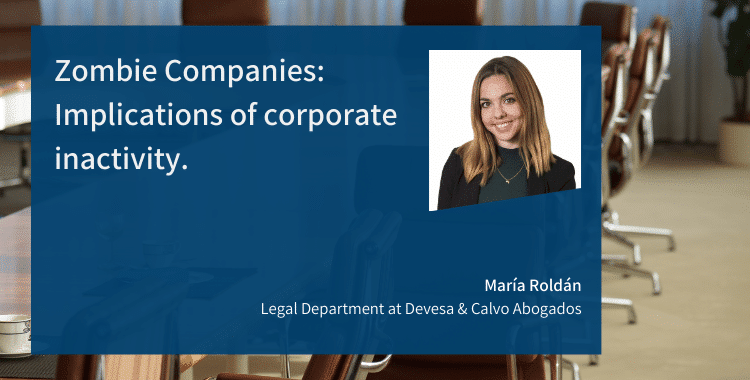
Zombie Companies: Implications of corporate inactivity.
It is not unknown that some businessmen have opted over the years to leave their companies “inactive” when, in fact, they should have opted for their dissolution and liquidation before they became the so-called “Zombie Companies”.
The purpose of this decision was none other than to avoid considerable dissolution and liquidation costs (basically, the formal procedure before the notary and the registration and liquidation of the ITPyAJD tax – Corporate Transactions).
Thus, the current scenario allowed the interested parties to opt for non-compliance with the legal obligations in order to avoid costs, since dissolving and liquidating the companies could be more expensive than simply leaving them inactive, and the chances of being penalized for this (provided that the tax obligations were complied with) were practically non-existent.
Does it compensate to leave my company inactive instead of dissolving and liquidating it?
According to the above, it can be agreed that it was simpler and less expensive to leave a company inactive rather than to liquidate it and assume its costs. However, it cannot be overlooked that keeping a company inactive carries a series of associated costs.
- To begin with, the fact that the company has ceased its activity means that it will not be obliged to file quarterly returns, but it must file Corporate Income Tax with the Tax Agency. Failing to file corporate income tax generates a penalty and, in order to avoid this, permanently inactive companies have usually taken the precaution of complying with these fiscal nature obligations.
- Additionally, the inactive company must continue to formulate, approve and file its Annual Accounts in the Mercantile Registry. Even so, the fact is that as long as the tax declarations to the Tax Authorities were complied with, failing to file the annual accounts with the corresponding Registry did not usually imply a specific sanction beyond the closing of the registry page, leading to a profitable inactivity situation. Only in very serious exceptions did the Accounting and Auditing Institute (Instituto de Contabilidad y Auditoría de Cuentas) intervene in accordance with the provisions of article 283 of the Capital Companies Act (Ley de Sociedades de Capital), sanctioning either the company, its administrators or both.
However, this scenario changes radically as of the entry into force of the Royal Decree 2/2021, of the 12th of January, approving the Regulations implementing Law 22/2015, of the 20th of July, 2015, on Account Auditing (Auditoría de Cuentas) and, in particular, its Eleventh Additional Provision:
(…)
“2.The criteria to determine the amount of the penalty, in accordance with the limits established in Article 283 of the revised text of the Capital Companies Act (Ley de Sociedades de Capital), approved by Royal Legislative Decree 1/2010, of the 2nd of July , shall be as follows:
- a)The penalty will be 0.5 per thousand of the total amount of the asset items, plus 0.5 per thousand of the entity’s sales figure included in the last declaration filed with the Tax Administration, the original must be provided in the procedure’s processing.
- b) In case of not providing the tax statement mentioned in the previous letter, the penalty will be set at 2 percent of the capital stock according to the data recorded in the Commercial Registry.
- c) In the event that the tax statement is provided and the result of applying the aforementioned percentages to the sum of the asset and sales items was greater than 2 percent of the capital stock, the penalty will be quantified reducing, at the latter mentioned case, a 10 percent“.
The Capital Companies Act (Ley de Sociedades de Capital) already established that, in the event of non-compliance with this obligation, penalties could be faced ranging from 1,200 to 60,000 Euros (if the annual turnover was over 6 million Euros, the fine limit for each year of delay will be increased 300,000 Euros). However, from now on, the commercial registrars will have to provide the files to the ICAC, and the ICAC will have at its disposal clear criteria to configure and apply the corresponding penalties for failure registering the Annual Accounts.
Thus, the previous weak sanctioning regime will be replaced by fully-fledged sanctioning criteria, which will probably achieve its objective of encouraging commercial companies to terminate their existence in the legally prescribed manner.
What implications can I assume as a director of an inactive company?
It should be borne in mind that corporate inactivity is intended for a period that does not exceed over one year. In this sense, if this situation is prolonged beyond the mentioned term -as it is the usual practice- the problems and responsibilities that this generates for the administration body must be taken into account. It is obliged to call a General Meeting of Partners or Shareholders within 2 months in order to take the appropriate measures. If it does not do so, the administrator can be declared responsible for the debts contracted by the company from that moment on.
In addition, if the company is in an insolvency situation, the lack of diligence by not presenting the accounts, can lead to the administrator having to respond for the company’s debts (the Insolvency Law (Ley Concursal) establishes as a case of liable insolvency the non formulation of the annual accounts, not submitting them to audit if obliged, and also the lack of deposit of them in the Mercantile Registry in any of the last three fiscal years prior to the insolvency declaration).
On the other hand, it should be taken into account that the General Tax Law (Ley General Tributaria) derives liability to the administrators when the existing tax obligations at the time of the inactivity approval are not paid. In view of the above, the administrators (both de facto and de jure) will be subsidiarily liable whenever they have not acted diligently, taking the appropriate steps to proceed with their payment.
Legal Department at Devesa & Calvo Abogados.
